

7 Benefits of a Deep Pressure Therapy Dog for Mental Health
by Lena Park
Last updated: July 4, 2025
Verified and Approved by:
Angela Morris,
MSW, LCSW
Fact Checked

Overview
Individuals facing mental health challenges often grapple with feelings of anxiety, loneliness, and the weight of PTSD symptoms. These emotional burdens can be overwhelming, leaving many to seek comfort and companionship in their daily lives. Deep pressure therapy dogs emerge as a compassionate solution, providing significant mental health benefits through their comforting presence and specialized training.
These remarkable dogs have the ability to alleviate anxiety symptoms, enhance daily functioning, and foster social interactions. Their nurturing nature creates a safe space for individuals to express their feelings and find solace. Imagine the warmth of a furry friend by your side, helping to ease the tension and loneliness that can accompany mental health struggles.
The impact of therapy dogs is profound; they can lead to a substantial reduction in anxiety, making them invaluable companions for those navigating their emotional journeys. As you reflect on your own experiences, consider how an emotional support animal could provide the companionship and comfort you deserve.
In this journey toward healing, it’s important to know that support is available. The presence of a therapy dog can truly transform lives, offering not just companionship but also a pathway to improved mental well-being.
Introduction
In a world where mental health challenges are increasingly prevalent, many individuals find themselves seeking comfort and support. The emotional struggles of anxiety, PTSD, and loneliness can feel overwhelming, leaving one yearning for relief. In this context, the role of deep pressure therapy (DPT) dogs emerges as a beacon of hope. These specially trained companions are not merely pets; they serve as lifelines, offering a calming presence that can alleviate these burdens.
As research continues to unveil the profound benefits of DPT dogs, their ability to reduce stress levels and enhance daily functioning becomes increasingly clear. This article explores the multifaceted advantages of DPT dogs, highlighting how they:
- Facilitate social interactions
- Instill a sense of security
- Transform the lives of those who embrace their companionship
Through expert insights and real-life testimonials, we illuminate the transformative journey of integrating a DPT dog into one’s life. This journey showcases the essential role these animals play in fostering emotional resilience and well-being, reminding us that support is available and that we are not alone in our struggles.
Wellness Wag: Streamlined ESA Letter Services for Mental Health Support
At Wellness Wag, we understand the emotional challenges many individuals face, particularly those dealing with mental health issues such as anxiety, depression, or PTSD. The companionship of an Emotional Support Animal (ESA) can provide significant comfort and assistance during these difficult times. Our process begins with a brief evaluation, allowing clients to express their emotional support needs and establish eligibility for an ESA letter.
Following this initial step, we conduct consultations with licensed medical professionals who thoroughly assess each client’s situation. This ensures that we understand the unique needs of each individual. Once an order is placed, clients receive a confirmation email detailing their purchase. After approval, clients can expect to receive their official ESA letter within 24 hours, empowering them to exercise their rights under the Fair Housing Act and Air Carrier Access Act.
Establishing a relationship with a licensed therapist is essential for obtaining an ESA letter. As noted by Younggren JN, “The mental health professional should see the patient both with and without the animal present, to compare the individual’s mental status and comportment in both contexts.” This practice not only ensures ethical standards but also fosters a deeper understanding of the client’s needs. A minimum 30-day relationship with a licensed therapist is required before an ESA letter can be issued.
With over 50,000 patients served, our commitment at Wellness Wag to facilitate access to emotional support through streamlined ESA letter services is evident. We prioritize client privacy and ethical data use throughout the process, ensuring that each individual feels cared for and supported. If you’ve been struggling, remember that you are not alone, and there is support available to help you through your journey.
Calm Anxiety: How Deep Pressure Therapy Dogs Alleviate Stress
Deep pressure therapy dogs offer a soothing presence by applying gentle, consistent pressure to their handlers, which can significantly alleviate anxiety. This tactile stimulation activates the parasympathetic nervous system, promoting a state of relaxation. Research has shown that interactions with DPT can lead to a notable decrease in cortisol levels, the primary stress hormone, enhancing emotional well-being. For example, studies indicate that participants experienced a reduction in average sadness scores from 11.12 before interaction to 10.34 after engaging with therapy animals, highlighting the profound impact these loving companions can have on mental health.
Moreover, case studies underscore the psychological benefits of DPT animals in various settings, such as universities, where programs allowing students to interact with canines have been linked to reduced anxiety and improved mood. Dr. Sakari Lemola, an associate professor in the psychology department, emphasizes the significance of these interactions, stating, “The implementation of dog interaction programs in universities serves as a low-cost and effective means to enhance student well-being.”
These findings illuminate the effectiveness of the deep pressure therapy dog as a valuable resource for mental health, especially for individuals facing stress and anxiety. Ongoing research continues to affirm that deep pressure therapy dogs play a vital role in stress relief, making them cherished companions for those in need of emotional support. Additionally, the ethical safeguards in the study’s design ensure the responsible care of both participants and therapy animals, further validating the positive outcomes associated with DPT canines.
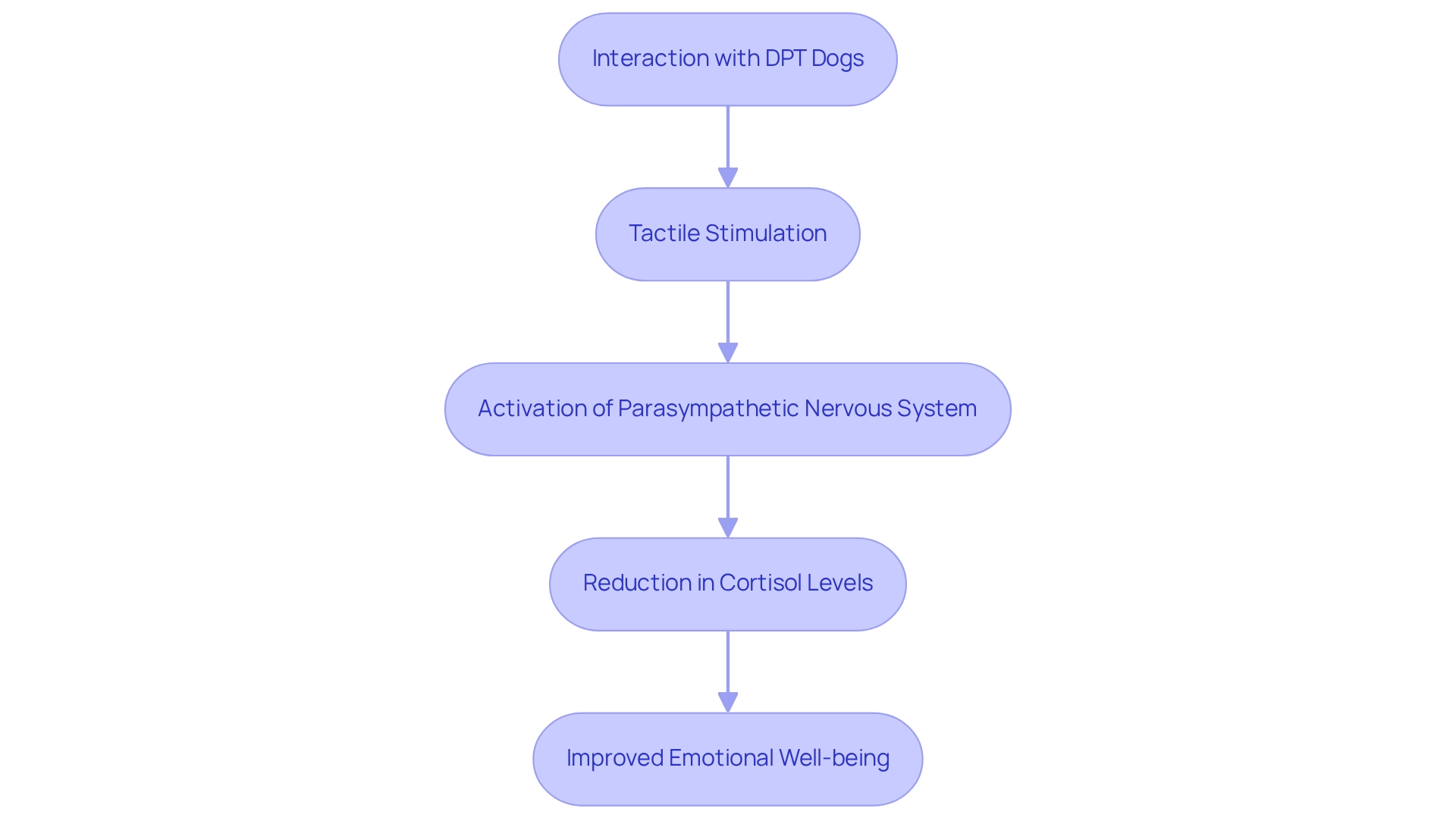
Support PTSD Symptoms: The Role of Deep Pressure Therapy Dogs
Deep pressure therapy dogs are increasingly recognized for their vital role in alleviating PTSD symptoms. A deep pressure therapy dog offers comfort during moments of anxiety or panic by lying close to their handlers or applying pressure to specific areas of the body. This tactile interaction serves to anchor individuals, effectively reducing the intensity of flashbacks and anxiety attacks.
Research has shown that the presence of a deep pressure therapy dog can lead to significant improvements in managing PTSD symptoms, with many individuals experiencing a decrease in their distress when interacting with these compassionate animals. Consider initiatives like Paws for Purple Hearts, which have demonstrated the positive effects of deep pressure therapy dogs on veterans facing PTSD.
While the program does encounter challenges such as long waitlists and extended training periods, the outcomes highlight the potential benefits of a deep pressure therapy dog in enhancing the quality of life for those affected by trauma. Currently, the pilot program is six months into its journey, and ongoing data collection may affirm its success as a therapeutic option for veterans across the nation.
Recent studies further endorse the effectiveness of deep pressure therapy dogs in managing PTSD symptoms, showcasing their ability to provide emotional support and companionship. Moreover, a deep pressure therapy dog can be particularly helpful during times of heightened anxiety or panic, offering a calming presence that assists individuals in regaining their sense of control.
As Layla Esposito, Ph.D., program director in NICHD’s Child Development and Behavior Branch, notes, incorporating therapy animals into treatment plans can significantly boost emotional well-being. The growing body of evidence underscores the essential role these animals play in therapeutic contexts, establishing them as invaluable allies on the path to mental wellness.
For immediate support, individuals can reach out to the national suicide and crisis lifeline in the U.S. by calling or texting 988, with additional resources available for veterans at www.veteranscrisisline.net/.
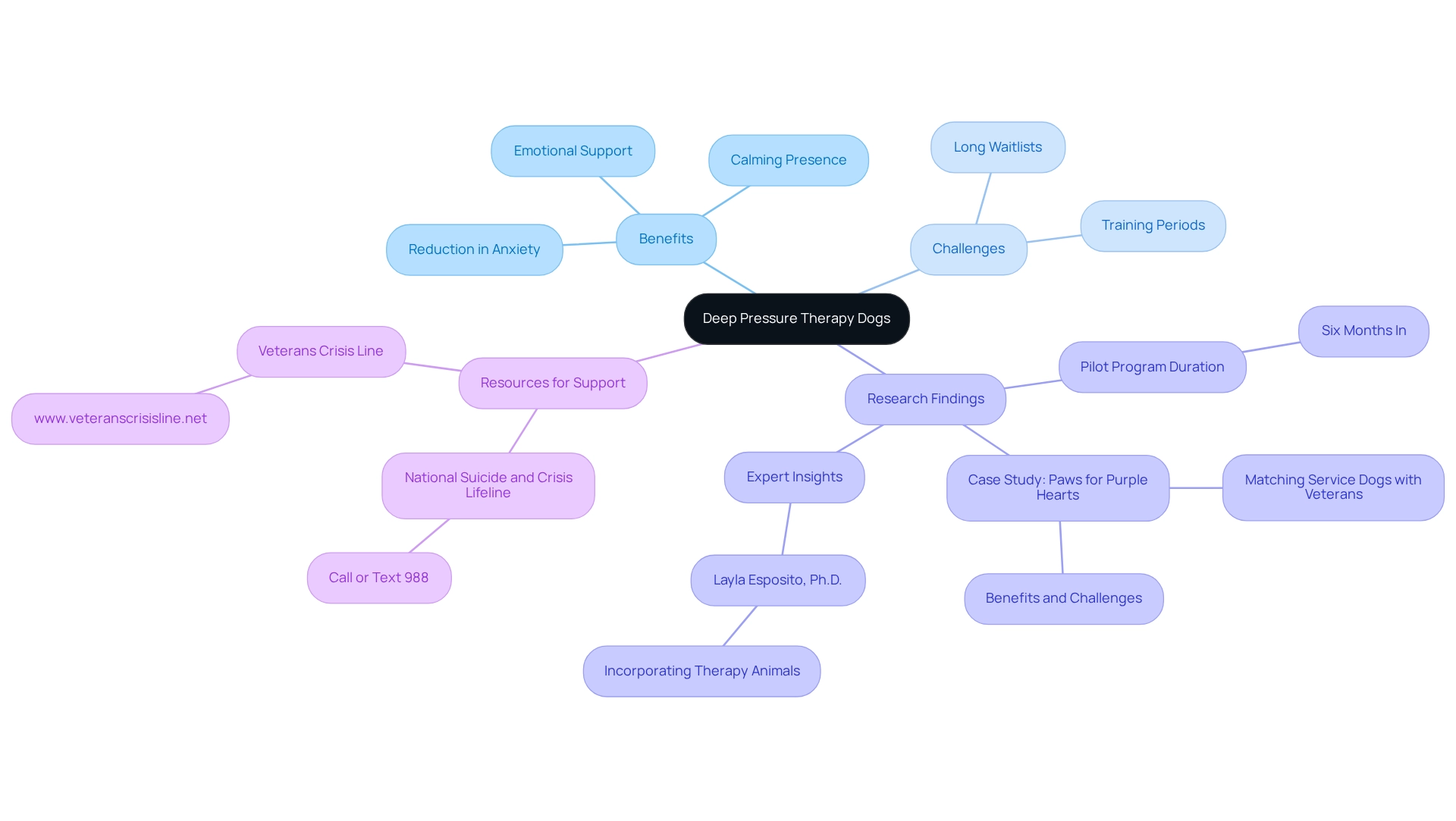
Combat Loneliness: Emotional Support from Deep Pressure Therapy Dogs
Deep pressure therapy dogs offer profound emotional support, extending far beyond mere physical comfort. They play a crucial role in alleviating feelings of loneliness. The companionship of a DPT dog nurtures a sense of connection, significantly diminishing isolation for individuals grappling with mental health challenges. Research indicates that pet companionship can lead to a notable reduction in loneliness, with studies showing that interactions with therapy animals can uplift mood and foster social involvement. However, it’s important to recognize that among the 21 studies evaluated in a 2015 review, all but one were deemed ‘underpowered’, underscoring the necessity for further research in this vital area.
These canines act as social catalysts, encouraging interactions between their handlers and others, which can be particularly beneficial in community settings. Individuals accompanied by a deep pressure therapy dog often find it easier to initiate conversations and participate in group activities, thus enriching their social networks. Experts affirm that the presence of a therapy dog can inspire individuals to venture beyond their comfort zones, promoting increased socialization and enhanced emotional well-being. Consistent training and reinforcement are essential to ensuring that emotional support animals flourish as companions, maximizing their effectiveness in providing assistance.
Moreover, the deep pressure these animals provide can have a soothing effect, aiding in the regulation of anxiety and stress levels. This therapeutic touch not only comforts the individual but also deepens the bond between the dog and its handler, fostering a supportive environment that cultivates emotional resilience. Case studies reveal that people who interact with deep pressure therapy dogs report significant improvements in their ability to manage loneliness and anxiety, highlighting the indispensable role these dogs play in mental health care.
As Linda S. shared, “Applying for an ESA through Wellness Wag was the best decision I made. It was an effortless process and the team was very professional.” This testimony not only underscores the exceptional service and prompt approval that Wellness Wag provides for ESA letters but also illustrates how their assistance opens the door to the emotional benefits of DPT animals. Furthermore, Wellness Wag’s flexible payment plans starting as low as $32.25 enhance accessibility for individuals seeking ESA letters, supporting their emotional well-being through animal companionship.
It’s crucial to recognize that emotional assistance animals do not possess the same legal rights as service animals under the Americans with Disabilities Act. In summary, a deep pressure therapy dog is an invaluable companion that combats loneliness and enhances social interactions, providing essential emotional support for those in need. As mentioned by Wellness Wag, small canines can also serve as effective emotional assistance animals, broadening the options available for individuals seeking companionship.
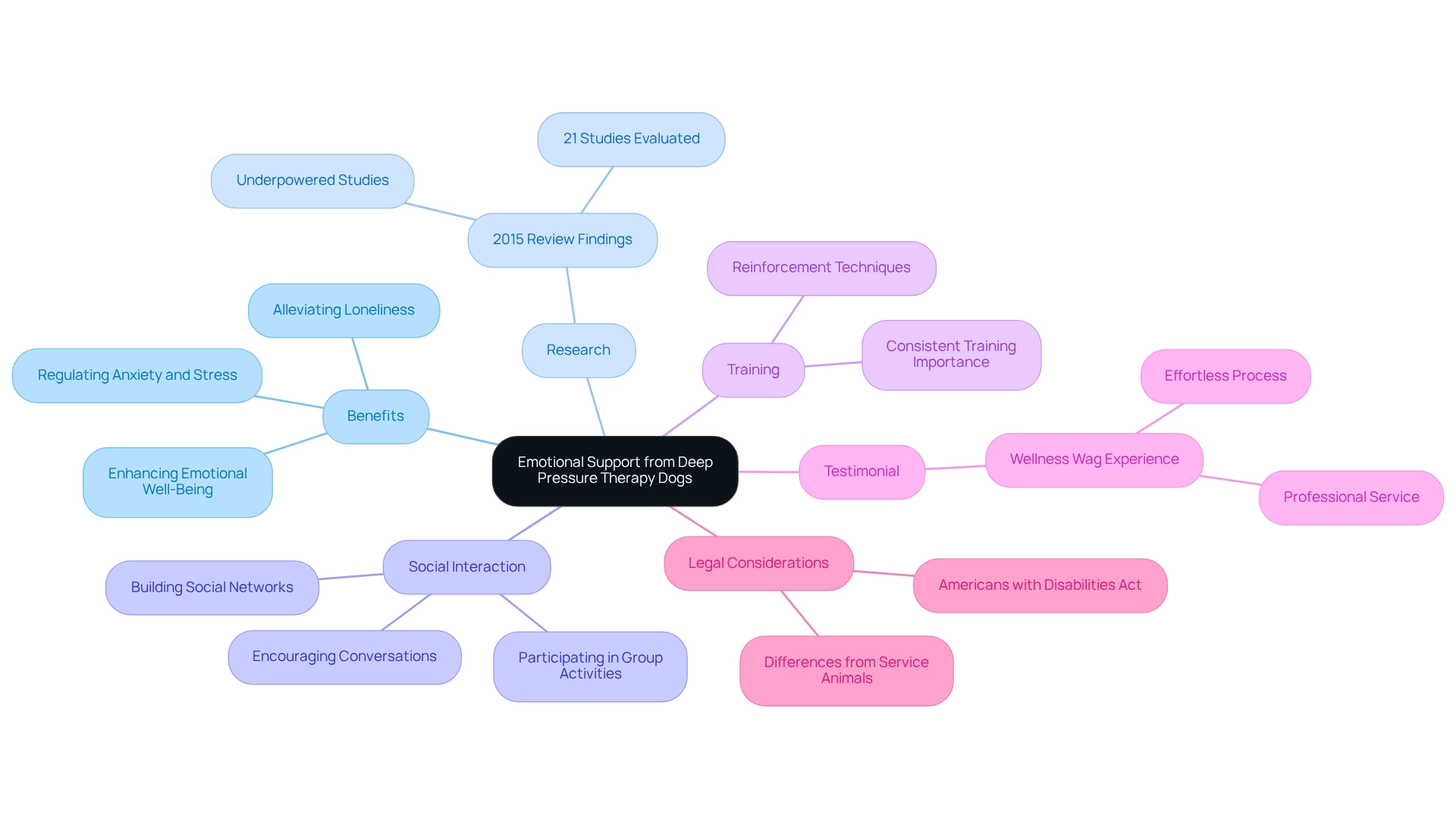
Enhance Daily Functioning: Motivation from Deep Pressure Therapy Dogs
Deep pressure therapy dogs play a crucial role in enhancing daily functioning by instilling motivation and structure in their handlers’ lives. Caring for a dog encourages adherence to daily routines, such as walking or exercising, which are vital for mental health. It’s heartening to note that research indicates 46.9% of pet owners believe having a pet positively influences their mental well-being, highlighting the importance of companionship in emotional support. The COVID-19 pandemic saw 20% of households acquiring at least one pet, reflecting a growing recognition of the mental health benefits associated with pet ownership.
The presence of a DPT dog can inspire individuals to engage in social activities, fostering connections that may otherwise be challenging due to mental health issues. These therapy animals encourage involvement in community activities or basic interactions, significantly improving overall quality of life. As Wendy Luterek, a former physical therapist, beautifully observed, “He’ll just go over and sit next to the person. It really is amazing to watch.” This motivation is further supported by research showing that therapy canines lead to significant enhancements in daily functioning, making them essential companions for those facing mental health difficulties.
In real-life situations, therapy dogs motivate people to step outside their comfort zones, whether it’s joining a group for a walk or attending social gatherings. The structured routine that comes with dog ownership can greatly alleviate symptoms of anxiety and depression, providing a sense of purpose and stability. Mental health experts often note that the companionship of a deep pressure therapy dog can be life-changing, providing both emotional assistance and practical motivation for individuals aiming to enhance their mental well-being.
Clients of Wellness Wag have shared their heartfelt experiences, with one stating, “I had a great experience with Wellness Wag. The approval process for my ESA was easy and hassle-free. Five stars from me!” Another client remarked, “Thanks to Wellness Wag, I received approval for my ESA quickly and without any difficulties. Their staff is friendly and caring.” These testimonials emphasize the efficient procedure Wellness Wag provides for acquiring ESA letters, facilitating access to the support needed.
Additionally, Wellness Wag offers flexible payment plans starting as low as $32.25 for obtaining ESA letters, making these valuable services more accessible. Pet owners are encouraged to consider comparing pet insurance rates to ensure informed decisions regarding their therapy pets.
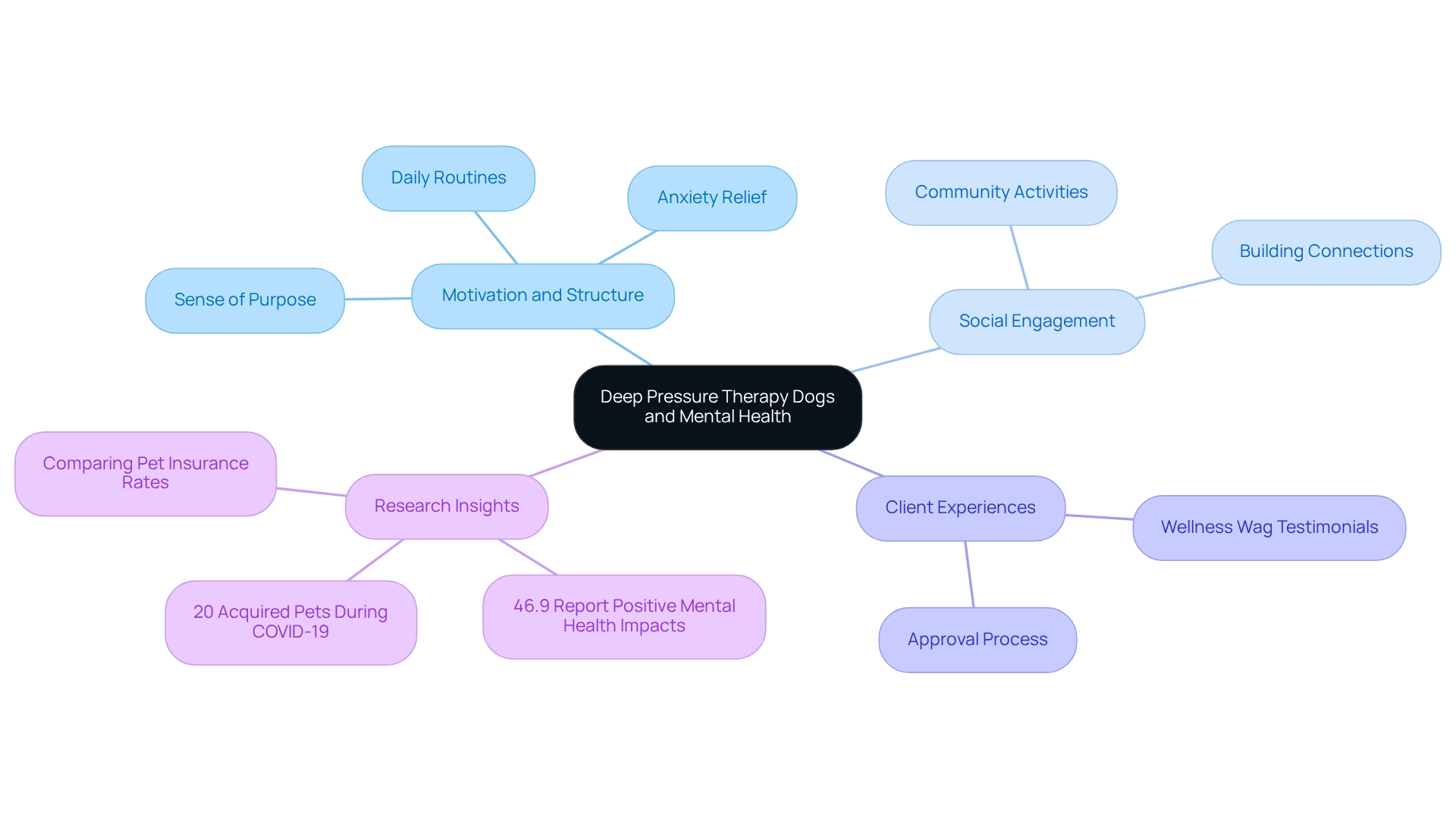
Facilitate Social Interactions: Deep Pressure Therapy Dogs as Social Bridges
Deep pressure therapy dogs play a vital role as social connectors, particularly for those grappling with social anxiety and various mental health challenges. Their comforting presence can significantly ease social interactions, acting as a focal point for conversation and alleviating the stress often associated with such situations. This dynamic not only fosters greater confidence but also enhances social skills, empowering individuals to forge meaningful connections.
Many individuals face emotional hurdles when navigating social environments. Research indicates that therapy animals can greatly enhance social interaction outcomes. A survey conducted during the COVID-19 pandemic revealed that 46.9% of respondents felt that pet ownership positively impacted their mental health. This highlights the potential of therapy animals in facilitating social engagement. The perception of deep pressure therapy dogs as valuable companions underscores their significance in helping individuals navigate social settings with greater ease. Furthermore, studies have shown that animal-assisted interventions can effectively address behavioral and emotional challenges, especially in children, indicating the broader relevance of therapy animals in various contexts, including adult social anxiety.
Real-world examples illustrate the transformative impact of deep pressure therapy dogs. For instance, therapy canines have been utilized in educational institutions and community centers to create a welcoming atmosphere, encouraging individuals to engage more openly. Social psychologists emphasize that the presence of a dog can lower anxiety levels, making it easier for people to connect with others. As therapist Marisa DiLeo poignantly noted, “If you’re open to exploring the power of paws, consider giving pet therapy a try.” This reinforces the notion that therapy animals can serve as a ‘social lubricant,’ easing tension in social settings and fostering interaction.
In conclusion, deep pressure therapy dogs not only provide emotional support but also serve as effective facilitators of social interaction. By considering the addition of a therapy dog to their lives, individuals can enhance their ability to navigate the complexities of social engagement with greater ease and assurance.
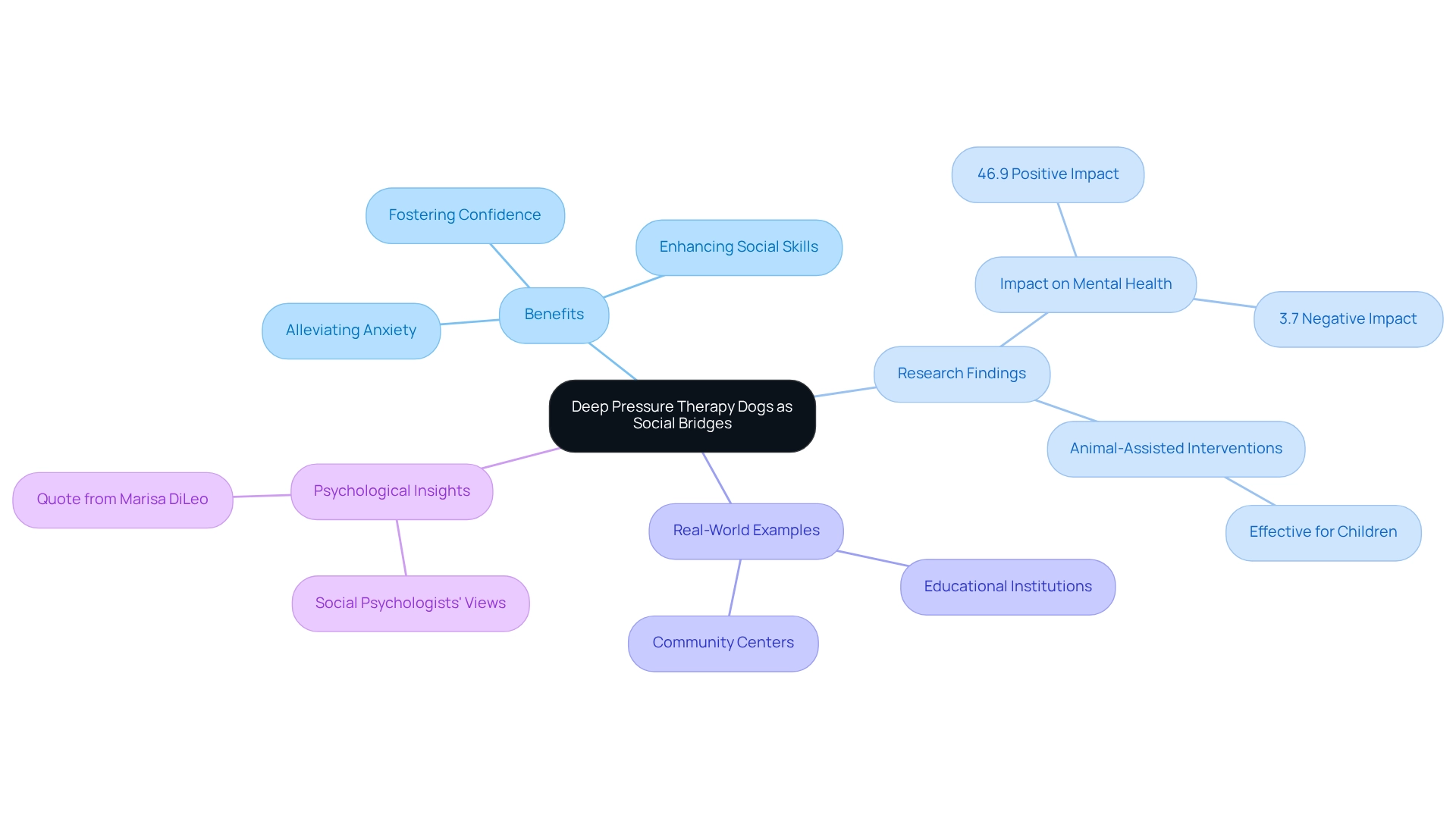
Increase Sense of Security: Safety Provided by Deep Pressure Therapy Dogs
Deep pressure therapy dogs play a vital role in enhancing their handlers’ sense of security. Their physical presence acts as a protective barrier, instilling a comforting sense of safety in various environments. This is particularly beneficial for individuals grappling with anxiety or PTSD, as the soothing effect of a deep pressure therapy dog can significantly alleviate feelings of fear and vulnerability. Research indicates that those with a deep pressure therapy dog report a notable increase in feelings of security, with studies revealing a kappa of 0.87 in coding related to the protective effects of these beloved companions, suggesting a strong consensus among participants regarding the emotional support provided by therapy animals.
Real-life examples illustrate the profound impact of DPT canines. Many handlers describe their pets as a deep pressure therapy dog, akin to a ‘4-legged cane,’ offering balance and stability in difficult situations. This comparison highlights the essential assistance that deep pressure therapy dogs provide, empowering individuals to navigate their surroundings with renewed confidence.
Expert insights further underscore the protective advantages of deep pressure therapy dogs. Mental health professionals emphasize that when individuals feel calm and secure, often with the support of a deep pressure therapy dog, they are better positioned to form lasting memories and engage meaningfully with their environment. Shelby Burnett, a social worker at Tonganoxie Elementary School, observes, ‘When you are calm, you create more solid memories,’ highlighting the importance of a deep pressure therapy dog in fostering emotional stability and safety.
Moreover, community support plays a crucial role in the training and integration of DPT canines. Case studies reveal that sharing experiences and receiving feedback can enhance the training process, making it more manageable and successful for both the handler and the dog. This collaborative approach not only strengthens the bond between the handler and their deep pressure therapy dog but also enhances the sense of security that these animals provide. For prospective service dog owners, patience and community education are vital; engaging with others who have experience can offer valuable insights and support throughout the training journey.
For working professionals, a deep pressure therapy dog can be especially helpful in managing stress during work-related situations. Their presence can help cultivate a soothing atmosphere, allowing individuals to concentrate more effectively and feel safer in their roles.
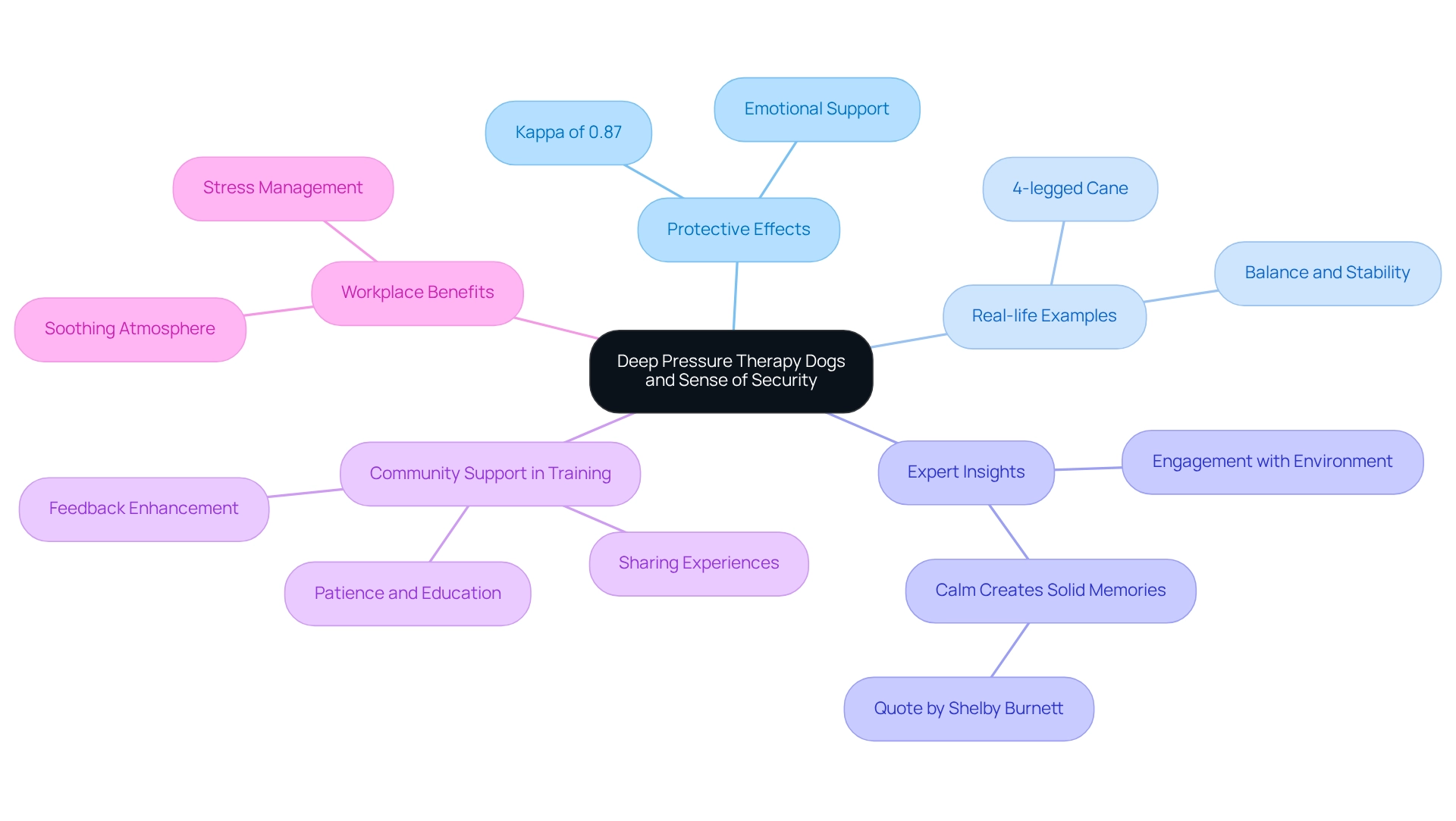
Receive Specialized Training: Ensuring Effectiveness of Deep Pressure Therapy Dogs
To be truly effective, deep pressure therapy dogs must undergo specialized training tailored to their unique role in supporting individuals facing mental health challenges. A service animal, as defined by the Americans with Disabilities Act (ADA), is a trained dog that performs tasks to assist a person with a disability. Deep pressure therapy dogs specifically deliver soothing pressure to help alleviate symptoms of anxiety, depression, and PTSD. Their training encompasses several key components:
- Learning to apply appropriate pressure
- Responding sensitively to their handler’s emotional cues
- Maintaining calm behavior in diverse environments
This training is essential, as it directly influences the animal’s ability to provide comfort and reassurance during moments of distress.
Research indicates that the effectiveness of therapy animals in mental health support is significantly enhanced by their specialized training. For instance, training programs typically span from six months to a year, beginning formal training when the dog is at least six months old. This rigorous preparation ensures that the deep pressure therapy dog can effectively assist their handlers, fostering a therapeutic bond that alleviates symptoms of anxiety, depression, and PTSD. A longitudinal study published by Oxford University Press found that participants with deep pressure therapy dogs as assistance animals reported significantly improved responses to environmental sounds, reduced tension, anxiety, and depression, and enhanced social involvement and independence. Expert trainers emphasize that without this specialized training, the potential advantages of DPT can remain unfulfilled. The training process not only equips the animals with necessary skills but also instills a sense of reliability and safety for their handlers. Consequently, well-trained deep pressure therapy dogs can profoundly influence the mental health of those they assist, making their training a vital component of their role as emotional companions.
Furthermore, recognizing the legal protections granted to deep pressure therapy dogs under the Americans with Disabilities Act (ADA) and the Fair Housing Act highlights the significance of their training in ensuring adherence and assistance for people with disabilities. Service dog owners enjoy full public access rights and are entitled to housing accommodations, even in areas where pets are typically restricted. This legal framework underscores the need for specialized training for DPT canines, ensuring they can carry out their duties efficiently while complying with the regulations that safeguard their handlers. Moreover, volunteering with groups such as Atlas can help broaden access to assistance animals for those in need, further enhancing the network of support available for people requiring emotional aid.
Manage Financial Considerations: Understanding Costs and Pet Insurance for Therapy Dogs
Navigating the financial landscape of acquiring a deep pressure therapy dog can feel overwhelming for potential handlers. The costs involved can be significant, encompassing training, veterinary care, and pet insurance. Training a DPT dog typically ranges from $1,000 to $3,000, depending on the program and the dog’s specific needs. Additionally, routine veterinary care and unexpected medical expenses can add to the financial burden, making pet insurance a valuable consideration.
It’s concerning to note that:
- 47% of pet parents have faced pet-related debt
- 42% cannot cover surprise vet bills, which can average between $800 and $1,500
This underscores the critical role of pet insurance in managing these potential financial strains. For instance, the average monthly premium for a five-year-old German shepherd can vary widely, with estimates ranging from $47 to $94 based on the provider and coverage options. As Paul Reynolds insightfully points out, ‘Breed alone can create a considerable difference in premiums,’ which emphasizes the importance of considering the dog’s breed when evaluating insurance costs.
Pet insurance serves not only to cover routine care but also acts as a safety net for unforeseen health issues, addressing the pressing question of ‘Why Pet Insurance?’ Statistics reveal that 1 in 3 canines will encounter an unforeseen injury or illness, highlighting the significance of having a robust insurance plan. This can significantly alleviate the financial stress associated with emergency veterinary care, making the integration of a deep pressure therapy dog into one’s life more feasible.
A case study titled ‘The Value of Pet Insurance’ illustrates that having the right pet insurance plan can greatly reduce the stress and financial impact of unforeseen pet health issues, encouraging pet owners to view insurance as a worthwhile investment.
Moreover, many organizations offer financial assistance or flexible payment plans to help offset the costs of training and care. This assistance can be crucial in providing therapy animals to individuals who may otherwise face challenges with the financial aspects. Understanding these costs and examining available resources can empower prospective handlers to make informed decisions about integrating a deep pressure therapy dog into their mental health framework.
It’s also important to recognize that pet insurance may come with additional costs, such as deductibles and varying reimbursement rates, which can further influence the overall financial commitment. Knowing this can help you feel more prepared and supported as you navigate this journey.
Transform Mental Health: The Comprehensive Benefits of Deep Pressure Therapy Dogs
Deep pressure therapy dogs offer significant advantages for individuals grappling with mental health challenges such as anxiety, PTSD, and loneliness. These specially trained companions provide emotional support that enhances daily functioning, fosters social interactions, and instills a comforting sense of security. Research shows that the presence of therapy animals can significantly alleviate symptoms of anxiety and depression, leading to improved overall well-being. Notably, statistics reveal that deep pressure therapy dogs can result in a 60% decrease in anxiety symptoms among their handlers, underscoring their effectiveness as a therapeutic resource.
The specialized training of a deep pressure therapy dog equips them to meet the unique needs of their handlers, making them essential allies in the journey toward mental health stability. For example, studies indicate that individuals with a deep pressure therapy dog experience a marked reduction in stress levels, which can be attributed to the soothing effects of the deep pressure therapy dog’s weight and presence during moments of distress. Expert opinions highlight the transformative benefits of a deep pressure therapy dog. Mental health professionals, such as Alison Yarp, MD, MPH, recognize that mental health conditions can lead to disability and hinder the ability to perform daily tasks, much like physical illnesses. DPT canines can facilitate therapeutic processes, enabling individuals to engage more fully in their treatment plans. The emotional bond nurtured by DPT canines not only alleviates feelings of loneliness but also encourages individuals to participate in social activities, thereby enhancing their quality of life.
Real-life stories illustrate the profound benefits of DPT canines. Many individuals report significant improvements in their mental health outcomes after welcoming a deep pressure therapy dog into their lives. These transformations highlight the importance of understanding the role of therapy canines in mental health care, especially in light of recent changes in regulations regarding emotional assistance animals and service animals.
In late 2020, the DOT amended the Air Carrier Access Act, no longer recognizing emotional assistance animals as service animals while ensuring that psychiatric service canines are treated the same as other service animals. This context is crucial for individuals navigating these changes. Furthermore, researching providers or training programs is vital when seeking a psychiatric service dog, as this can greatly influence the effectiveness of the support provided. As the landscape of mental health support evolves, the role of the deep pressure therapy dog remains essential, offering not just companionship but also a pathway to healing and resilience.
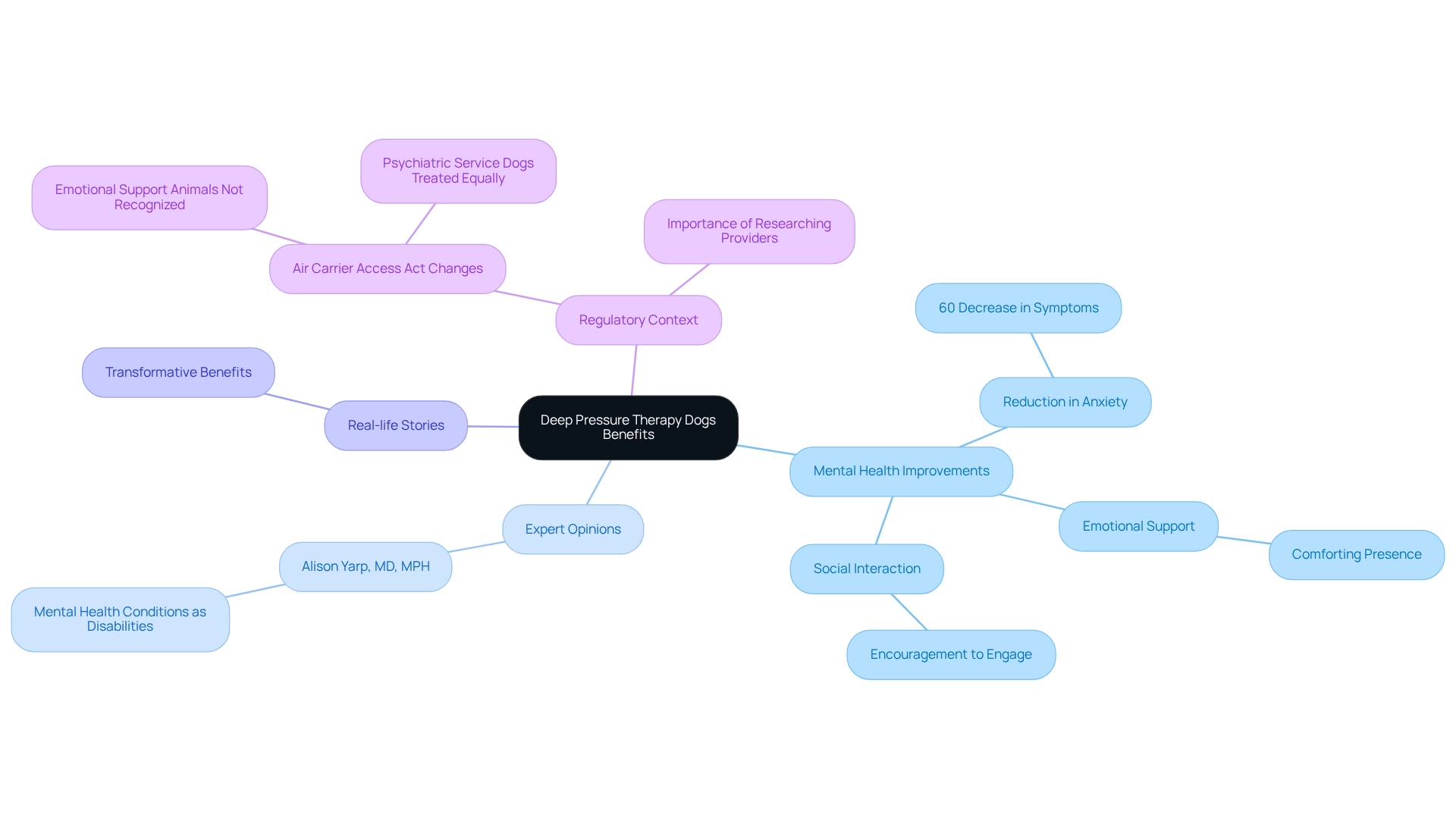
Conclusion
Deep pressure therapy (DPT) dogs are emerging as vital companions for those facing mental health challenges such as anxiety, PTSD, and loneliness. These compassionate animals provide emotional support that not only enhances daily functioning but also fosters social interactions and instills a sense of security. Research highlights a significant reduction in anxiety symptoms—up to 60%—demonstrating how these specially trained animals can be invaluable allies in the pursuit of mental wellness.
The transformative benefits of DPT dogs are evident in their unique training, which enables them to respond effectively to their handlers’ specific needs. By applying gentle pressure during moments of distress, they activate the parasympathetic nervous system, promoting relaxation and emotional stability. This nurturing relationship alleviates feelings of isolation and encourages individuals to engage more fully in their treatment and social activities, ultimately enhancing their quality of life.
As the landscape of mental health support continues to evolve, understanding the role of DPT dogs becomes increasingly important. With changes in regulations regarding emotional support and service animals, individuals must navigate these complexities to access the support they need. Organizations like Wellness Wag facilitate this process by providing streamlined services for obtaining Emotional Support Animal letters, making it easier for individuals to embrace the emotional benefits of DPT dogs.
In summary, the integration of deep pressure therapy dogs into mental health care represents a significant step toward healing and resilience. These animals not only offer companionship but also serve as essential tools for emotional support, empowering individuals to reclaim their lives and foster connections in a world that often feels isolating. Remember, you are not alone in this journey, and the support of DPT dogs can make a meaningful difference.
Frequently Asked Questions
What is the purpose of an Emotional Support Animal (ESA) at Wellness Wag?
The purpose of an ESA at Wellness Wag is to provide significant comfort and assistance to individuals facing emotional challenges, particularly those dealing with mental health issues such as anxiety, depression, or PTSD.
What is the process to obtain an ESA letter at Wellness Wag?
The process begins with a brief evaluation to express emotional support needs and establish eligibility for an ESA letter. This is followed by consultations with licensed medical professionals who assess the client’s situation. Once an order is placed, clients receive a confirmation email, and after approval, the official ESA letter is sent within 24 hours.
Is there a requirement for establishing a relationship with a therapist before obtaining an ESA letter?
Yes, a minimum 30-day relationship with a licensed therapist is required before an ESA letter can be issued. This ensures a thorough understanding of the client’s needs and ethical standards are maintained.
How many patients has Wellness Wag served?
Wellness Wag has served over 50,000 patients, demonstrating their commitment to facilitating access to emotional support through streamlined ESA letter services.
What are deep pressure therapy dogs and how do they help with anxiety?
Deep pressure therapy dogs provide a soothing presence by applying gentle, consistent pressure to their handlers, which can significantly alleviate anxiety by promoting relaxation and reducing cortisol levels, the primary stress hormone.
What evidence supports the effectiveness of deep pressure therapy dogs?
Research indicates that interactions with deep pressure therapy dogs can lead to decreases in average sadness scores and improvements in mood, particularly in settings like universities where programs allow student interaction with therapy animals.
How do deep pressure therapy dogs assist individuals with PTSD?
Deep pressure therapy dogs offer comfort during anxiety or panic by lying close to their handlers, which helps reduce the intensity of flashbacks and anxiety attacks, leading to significant improvements in managing PTSD symptoms.
What challenges are associated with deep pressure therapy dog programs?
Challenges include long waitlists and extended training periods for the dogs, but the positive outcomes highlight their potential benefits for enhancing the quality of life for those affected by trauma.
Where can individuals seek immediate support if they are struggling?
Individuals can reach out to the national suicide and crisis lifeline in the U.S. by calling or texting 988, with additional resources available for veterans at www.veteranscrisisline.net/.
Certify Your Emotional Support Animal Today

Why You Can Rely on Us?
At Wellness Wag, we believe your pet deserves care rooted in both science and compassion. Each article is carefully researched, written in clear language for pet owners, and then reviewed by qualified professionals to ensure the information is evidence-based, current, and practical for real-life care. Our goal is to help you feel confident in making informed decisions about your pet’s health and well-being.
Reviewed by
Angela Morris, MSW, LCSW
Angela is a licensed clinical social worker with 20 years of experience in patient advocacy and community mental health. She has assisted numerous clients with ESA evaluations and brings a deep understanding of disability accommodations, ensuring that all information is accurate, supportive, and practical.

Written by :
Lena Park
Last Updated :
July 4, 2025












